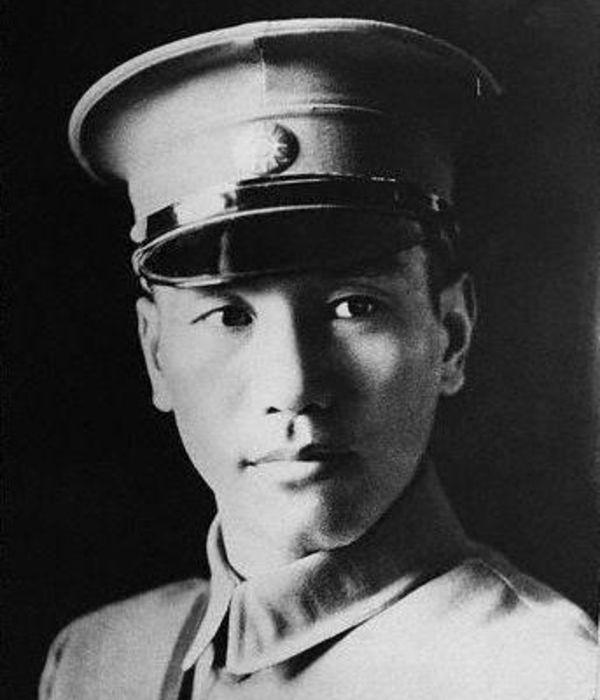Today's Birthday
Chiang Kai-shek1887–1975, Chinese Nationalist leader. He was also called Chiang Chung-cheng.
After completing military training with the Japanese Army, he returned to China in 1911 and took part in the revolution against the Manchus (see Ch'ing). Chiang was active (1913–16) in attempts to overthrow the government of Yüan Shih-kai. When Sun Yat-sen established (1917) the Guangzhou government, Chiang served as his military aide. In 1923 he was sent by Sun to the USSR to study military organization and to seek aid for the Guangzhou regime. On his return he was appointed commandant of the newly established (1924) Whampoa Military Academy; he grew more prominent in the Kuomintang after the death (1925) of Sun Yat-sen.
In 1926 Chiang launched the Northern Expedition, leading the victorious Nationalist army into Hankou, Shanghai, and Nanjing. Chiang followed Sun Yat-sen's policy of cooperation with the Chinese Communists and acceptance of Russian aid until 1927, when he dramatically reversed himself and initiated the long civil war between the Kuomintang and the Communists. By the end of 1927, Chiang controlled the Kuomintang, and in 1928 he became head of the Nationalist government at Nanjing and generalissimo of all Chinese Nationalist forces. Thereafter, under various titles and offices, he exercised virtually uninterrupted power as leader of the Nationalist government.
In 1936 Gen. Chang Hsueh-liang siezed him at Xi'an, to force him to terminate the civil war against the Communists in order to establish a united front against the encroaching Japanese. Despite the resultant truce, Chiang's release, and the 1937 outbreak of the Second Sino-Japanese War, the agreement between Nationalists and Communists soon broke down. By 1940 Chiang's best troops were being used against the Communists in the northwest. After the Japanese took Nanjing and Hankou, Chiang moved his capital to Chongqing.
As the Sino-Japanese War merged with World War II, Chiang's international prestige increased. He attended the Cairo Conference (1943) with Franklin Delano Roosevelt and Winston Churchill. He and his wife, Soong Mei-ling (see Soong, family), were the international symbols of China at war, but Chiang was bitterly criticized by Allied officers, notably Joseph W. Stilwell, and argument raged over his internal policies and his conduct of the war.
After the war ended Chiang failed to achieve a settlement with the Communists, and civil war continued. In 1948 Chiang became the first president elected under a new, liberalized constitution. He soon resigned, however, and his moderate vice president, Gen. li tsung-jên, attempted to negotiate a truce with the Communists. The talks failed, and in 1949 Chiang resumed leadership of the Kuomintang to oppose the Communists, who were sweeping into S China in strong military force and reducing the territories held by the Nationalists.
By 1950 Chiang and the Nationalist government had been driven from the mainland to the island of Taiwan (Formosa) and U.S. aid had been cut off. On Taiwan, Chiang took firm command and established a virtual dictatorship. He reorganized his military forces (U.S. aid resumed with the start of the Korean war) and then instituted limited democratic political reforms. Chiang continued to promise reconquest of the Chinese mainland and at times landed Nationalist guerrillas on the China coast, often to the embarrassment of the United States. His international position was weakened considerably in 1971 when the United Nations expelled his regime and accepted the Communists as the sole legitimate government of China. He remained President until his death in 1975.
Bibliography:
Chiang Kai-shek's writings have appeared in English as China's Destiny (1947) and Soviet Russia in China (1957). See also P. P. Y. Loh, The Early Chiang Kai-Shek (1971); and biographies by W. Morwood (1980) and Seam Dolan (1988).
Who2. Copyright © 1998-2006 by Who2?, LLC. All rights reserved.
Also Born on October 31
- Jan Vermeerpainter (1632)
- John Keatspoet (1795)
- Juliette Gordon Lowfounder of the Girl Scouts of America (1860)
- Dale Evansactor and singer (1912)
- Barbara Bel Geddesactress (1922)
- Michael Collinsastronaut (1930)
- Dan Rathertelevision journalist, writer (1931)
- Michael Landonactor (1936)
- Jane PauleyTV journalist (1950)
- Peter Jacksondirector (1961)
Who Shares Your Birthday?
The Day You Were Born
The Year You Were Born











